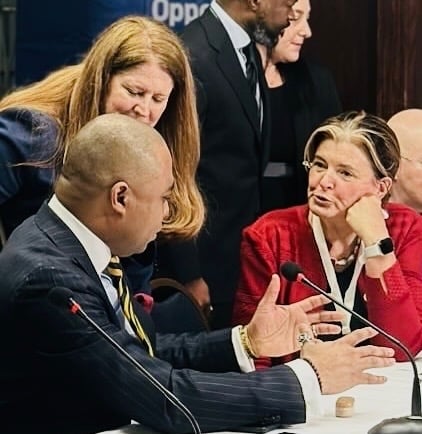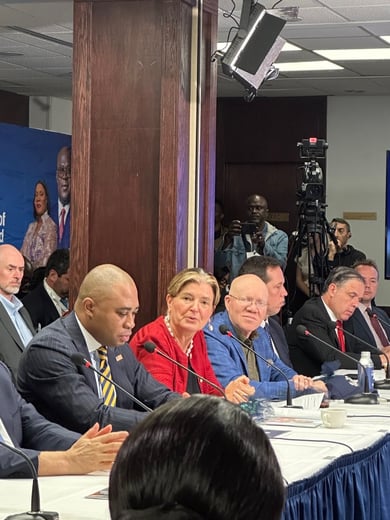Investing in People: Planet Aid’s Message at the U.S.–DRC Investment Forum
 On October 15, 2025, Planet Aid’s Executive Director for Global Partnerships, Marie Lichtenberg, joined global leaders, investors, and policymakers at the U.S.–DRC Investment Forum in Washington, D.C. The two-day event, hosted by DRC Forum USA LLC, brought together stakeholders committed to unlocking the immense potential of the Democratic Republic of Congo (DRC) through ethical investment, innovation, and collaboration.
On October 15, 2025, Planet Aid’s Executive Director for Global Partnerships, Marie Lichtenberg, joined global leaders, investors, and policymakers at the U.S.–DRC Investment Forum in Washington, D.C. The two-day event, hosted by DRC Forum USA LLC, brought together stakeholders committed to unlocking the immense potential of the Democratic Republic of Congo (DRC) through ethical investment, innovation, and collaboration.
At the event, Lichtenberg highlighted what she called “the greatest resource of the DRC—its people.”
While much of the forum’s discussion focused on the nation’s vast mineral wealth, fertile land, and emerging markets, she reminded participants that human capital is the foundation for sustainable growth.
“As they strive to make ends meet and send their children to school, you see strong-willed communities innovating to build a better future,” she said. “The people of the DRC have an unwavering human spirit, determination, and resiliency.”
Planet Aid and HPP-Congo: Building Human Capital for Sustainable Growth
 Representing Planet Aid and its long-standing local partner Humana People to People Congo (HPP-Congo), Lichtenberg informed attendees about nearly two decades of collaboration between HPP-Congo, the Government of the DRC, and local communities to strengthen education, health, and economic development.
Representing Planet Aid and its long-standing local partner Humana People to People Congo (HPP-Congo), Lichtenberg informed attendees about nearly two decades of collaboration between HPP-Congo, the Government of the DRC, and local communities to strengthen education, health, and economic development.
HPP-Congo is part of the Humana People to People Federation, a network of 29 member organizations working across Asia, Africa, Europe, and the Americas. For nearly 30 years, Planet Aid has supported this global network by securing U.S. grant funding from agencies such as USAID, the USDA, and the CDC. These grants fund programs that promote education, public health, agricultural productivity, and environmental sustainability in communities around the world.
Through this partnership, Planet Aid helps mobilize resources and expertise that enable local organizations like HPP-Congo to lead transformative, community-driven development.
Strengthening Communities Through Education and Health
Lichtenberg underscored that investing in people—through education, training, and healthcare—is not only a moral imperative but also a smart business strategy for investors looking to build long-term success in the DRC.
Today, 46% of the DRC’s population is under 15, making the need for job creation and skill development urgent. HPP-Congo’s 400 staff and 6,100 volunteers are already meeting this challenge head-on, operating projects that impact over 2.7 million Congolese annually across 13 provinces.
The organization’s vocational training programs prepare youth and adults for careers in agriculture, energy, and entrepreneurship—adapting coursework to the needs of local markets. Meanwhile, its teacher training colleges help ensure that students in rural areas receive quality education and are motivated to seize new opportunities.
Lichtenberg also emphasized the link between health and productivity, noting that while education builds skills and aspirations, health keeps communities strong and workforces stable.
Through programs like Total Control of the Epidemic (TCE)—developed in partnership with the Ministry of Health—HPP-Congo has reached over 10 million people across 10 provinces, strengthening community health systems to fight tuberculosis, malaria, and HIV.
Investing in Smallholder Farmers for Big Impact
Agriculture is another area where Lichtenberg sees transformative potential. The DRC has an estimated 80 million hectares of arable land, yet only about 10% is currently cultivated. Most farmers are smallholders who could dramatically increase yields with training and access to resources.
Through HPP-Congo’s Farmers’ Clubs, more than 30,000 smallholder families in Kasai, Kongo Central, Sud Ubangi, and Tshopo are receiving hands-on support. Funded by the World Bank, the European Union, and the Ministry of Agriculture, these programs have doubled or even tripled farmers’ production and income—for an investment of just $100 per farming family per year.
The program helps farmers access markets, form micro-savings groups, and develop drought-resilient seeds. These interventions not only improve livelihoods but also strengthen national food security and economic stability.
A Call for Collaborative, Responsible Investment
Lichtenberg also urged partners with a call to action for the forum’s attendees: to pair financial investment with social responsibility.
She outlined three key principles for investors seeking lasting success in the DRC:
- Invest in people. Partner with community organizations like HPP-Congo that have deep local roots and trust. These partnerships provide invaluable insights and connections for entering new markets.
- Prioritize education and health. With 95% of the population under age 50, the DRC’s workforce has tremendous potential. Supporting education, training, and health ensures a stable and skilled labor force.
- Integrate social responsibility. Corporate social responsibility (CSR) is not a burden—it’s a strategic advantage. By working through existing community networks, investors can strengthen both their business outcomes and the well-being of local populations.
“It is our collective responsibility to ensure that Congolese communities also receive the benefits from your investments in their homeland,” Lichtenberg said.
A Shared Vision for the Future
As the DRC continues to implement government reforms and foster an investor-friendly environment, forums like this one highlight the importance of aligning profit with purpose.
Planet Aid and HPP-Congo stand ready to partner with public and private stakeholders to ensure that investment in the DRC drives not only economic growth but also inclusive, community-centered development.
“The DRC is making incredible progress and creating a wealth of opportunities,” Lichtenberg concluded. “We welcome all of you to partner with us as you invest in the future of the DRC.”
